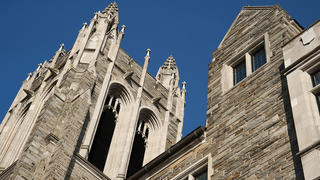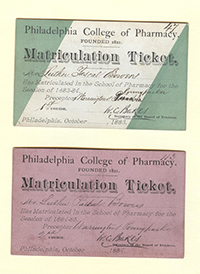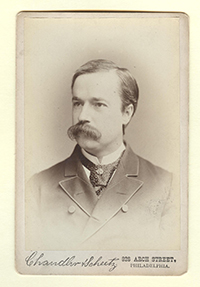A Ticket to Learn

Editor's note: This article was written prior to University of the Sciences' merger with and into Saint Joseph's University and does not reflect the current, combined institution. References to programs, offices, colleges, employees, etc., may be historical information.
 Back before tuition payments, students attending Philadelphia College of Pharmacy in the 19th century would purchase lecture tickets in what was essentially a season pass from each professor to get into class. The money from each went directly to the professors pockets, minus expenses paid to the college and other sundry bills.
Back before tuition payments, students attending Philadelphia College of Pharmacy in the 19th century would purchase lecture tickets in what was essentially a season pass from each professor to get into class. The money from each went directly to the professors pockets, minus expenses paid to the college and other sundry bills.
Getting a diploma required two years of college and the completion of a minimum four-year apprenticeship. Students typically matriculated two years shy of their apprenticeship fulfillment, making the college an after-work night school.
At PCP’s establishment in 1821 there wasn’t any difference between the first- and second-year lectures. This outdated system changed in the fall of 1878 when a graded two-year curriculum was introduced, which physically separated the student body into two distinct groups, the junior class and the senior class. Henceforth, promotion to the second year relied on passing examinations. A collection of 15 lecture tickets issued by PCP in the 19th century was gifted to the University by Mark J. Cziraky PharmD’92 in 2015.
 Another simultaneous development was the opening of the Laboratory Annex, a massive four-story building that doubled the size of the campus and stimulated the creation of a new faculty position—professor of analytical chemistry—and its related mandatory senior course in analytical chemistry.
Another simultaneous development was the opening of the Laboratory Annex, a massive four-story building that doubled the size of the campus and stimulated the creation of a new faculty position—professor of analytical chemistry—and its related mandatory senior course in analytical chemistry.
The professorial faculty at the time included Joseph P. Remington (pharmacy), John M. Maisch (materia medica and botany), Samuel P. Sadtler (chemistry), and Henry Trimble (analytical chemistry).
Although personal assistants had been informally recruited by faculty members in the past, it was not until 1881 that the first official assistant professors appeared on the scene, namely C. Frederick Zeller (pharmacy), Henry Trimble (chemistry), and John E. Cook (materia medica and botany).
